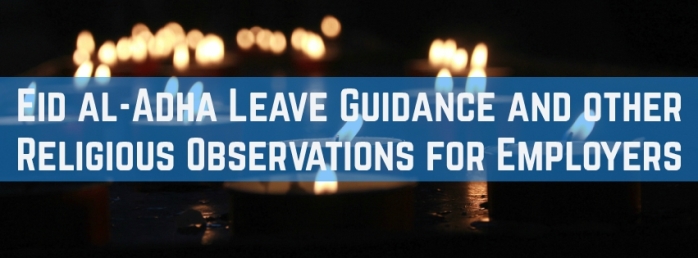Religious Observances
|
|
|
| This year it is anticipated to begin on the 11th August 2019. However, the exact date of Eid is dependent on the sighting of the moon, so be prepared to receive requests for time off at short notice. Requests for time off should be dealt with under your normal leave of absence process. However, requests need to be considered fully, including the practicalities of accommodating such requests. Employers should not refuse requests without consideration merely because it is a busy time or because others have taken time off. Employers should ensure that they have a policy in place that covers such requests. PACT HR has a Leave of Absence Policy which incorporates time off for religious observance. Time off is at the discretion of the employer. However, for teachers’ the terms and conditions allow for up to 3-days with pay for attendance at a religious ceremony or observation of religious festival which the teacher is under a moral obligation to attend or observe. The festival of Eid would fit this description for practicing Muslims. For support staff their terms and conditions do not cover this and any time off is likely to be unpaid unless otherwise agreed by the Governing Body. Employers are not legally obliged to grant requests for leave on religious grounds but some flexibility can improve staff morale. Discussion and planning of this in advance is likely to minimise the impact of any such requests. Some Head teachers in School’s with a large number of Muslim pupils may want to consider attendance levels when granting leave of absence for staff. Ultimately, just like any leave of absence – time off is at the discretion of the Head and is dependent on the needs of the School. Employers should be mindful that making allowances for observance to employees of one religion, but refusing to provide equivalent benefits to employees of a different one, will amount to direct religious discrimination and is unlawful under the Equality Act 2010. Religious Observances in United Kingdom in 2019 (Please note this list is not exhaustive) |
| Date | Day | Name | Type |
| 11 Aug | Sunday | Tisha B'Av | Jewish holiday |
| 12 Aug | Monday | Eid Al-Adha | Muslim |
| 15 Aug | Thursday | Assumption of Mary | Christian |
| 15 Aug | Thursday | Raksha Bandhan | Hindu Holiday |
| 23 Aug | Friday | Janmashtami | Hindu Holiday |
| 1 Sep | Sunday | Muharram/Islamic New Year | Muslim |
| 2 Sep | Monday | Ganesh Chaturthi | Hindu Holiday |
| 10 Sep | Tuesday | Ashura | Muslim |
| 29 Sep | Sunday | Navaratri | Hindu Holiday |
| 30 Sep | Monday | Rosh Hashana | Jewish holiday |
| 4 Oct | Friday | Feast of St Francis of Assisi | Christian |
| 7 Oct | Monday | Dussehra | Hindu Holiday |
| 9 Oct | Wednesday | Yom Kippur | Jewish holiday |
| 14 Oct | Monday | First day of Sukkot | Jewish holiday |
| 20 Oct | Sunday | Hoshana Rabbah | Jewish holiday |
| 21 Oct | Monday | Shemini Atzeret | Jewish holiday |
| 22 Oct | Tuesday | Simchat Torah | Jewish holiday |
| 27 Oct | Sunday | Diwali/Deepavali | Hindu Holiday |
| 1 Nov | Friday | All Saints' Day | Christian |
| 2 Nov | Saturday | All Souls' Day | Christian |
| 10 Nov | Sunday | Milad un Nabi (Mawlid) | Muslim |
| 8 Dec | Sunday | Feast of the Immaculate Conception | Christian |
| 23 Dec | Monday | First Day of Chanukah | Jewish holiday |
| 25 Dec | Wednesday | Christmas | Christian |
| 30 Dec | Monday | Last day of Chanukah | Jewish holiday |
For more info on how PACT HR can support you, feel free to give PACT HR a call on 01274 436644 and let us help you improve your workforce. |
